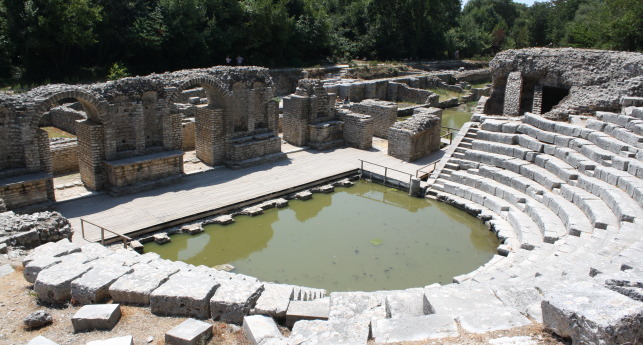
After previously keeping the plan under wraps, citing economic confidentiality, the Albanian government has published the full business plan of the management of the Butrint National Park in the south of the country, as a foundation.
Butrint is one of Albania’s most important archaeological sites and features an immense wealth of cultural, historical, and natural values and is both a UNESCO World Heritage Site and a National Park. It contains archaeological sites and relics dating back from the 10th century BC.
Today, it is a popular tourist destination, attracting thousands of visitors every year. It is accessible via purchase of a ticket and the site features a small café and souvenir shop.
Last Tuesday, the assembly started discussing a draft law “on the approval of the agreement for the administration of sub-zones of cultural heritage and cultural landscape of Butrint National Park between the Ministry of Culture and the Butrint Management Foundation.”
In 2020, a law was adopted to pave the way for the area to be controlled by the Ministry of Culture and a “Strategic Partner”. The change was a part of the “Integrated Management Plan for Butrint National Park”, a three hundred-page document approved by the government. The document was drafted by a British law firm called Price and Pearce who were contracted and financially supported by the Albanian American Development Foundation (AADF).
AADF are also involved in the development of the Pyramid of Tirana and is a non-profit registered in Delaware, USA. Other economic activities in Albania include a minority stake in the concession to produce passports and ID cards.
This would place Butrint, for the first time in its history, into the hands of a non-public entity. The Ministry at the time said a foundation would be established and subject to legislation on non-profit organisations.
At the time, the AADF said they may be interested in being a part of the project, although this would mean they were involved in drafting the law that would allow them to be a part of the project. Now it has been confirmed that they will be involved as the draft law foresees them managing it for 10 years in exchange for a grant of $5 million.
Meanwhile, the Albanian government will plough in all the money in Butrint’s coffers that has so far, not been used. The site generates around $1 million a year, but currently, only 30% is used to run it.
The news sparked concern at the time, with researcher Agron Alibali saying that putting Butrint in the hands of a foundation is a violation of the Paris Convention as it sets out that the state should be solely responsible for the administration of cultural assets.
Neritan Ceka, an archaeologist, said no archaeologists were involved in the plan.
But the discussion that started in parliament last week resulted in controversy after the draft law failed to make public the agreement between the government and the AADF.
Opposition MP Ina Zhupa claimed that “Butrint is being given as a concession by secret agreement” and that there was no certainty over who was involved. She also noted that the government had failed to include the Committee on Economy, as required by law.
The opposition called for the meeting to be postponed until the document and all information were made available in full, but the meeting continued.
Minister of Culture Elva Margariti admitted the agreement was classified but only due to the economic aspects of the business plan. She added it was also kept secret as it could be misinterpreted by MPs.
She said that the format of managing sites through foundations could be extended to other cultural heritage sites. The minister also confirmed that the state has monitoring mechanisms for the foundation that will work Butrint and can intervene in cases of failed management.
But keeping the exact details of the agreement secret resulted in numerous debates in parliament and claims that the government was selling off Albanian heritage.
Prime Minister Edi Rama reacted strongly during the parliamentary debate, dismissing criticisms as “anti-American” and calling the opposition fools.
“Stupidity in your family is a contagious disease because there is no other way to explain that it is inherited from generation to generation,” Rama said, adding, “You have it in your party’s DNA to inherit stupidity from generation to generation,”
The plan will see Butrint include shops, cafés, and various leisure initiatives. It also foresees increasing the ticket price to $11 over seven years, resulting in $1.5 million in profit at the end of that period. It predicts that visitors will increase to 296,000 from 236,000 before the pandemic.
The food and beverage aspect of the plan will bring $296,000 according to the plan. By the end of the first seven years, total revenue is predicted to be $3.7 million of which $1.5 million is profit. The agreement states that profits are retained by the foundation.
In addition, the current 14 staff will be increased to 44 with higher salaries than regular public administration salaries.
A board will also be created that will cost $140,000 a year. Its members currently include Minister Elva Margariti, heads of AADF Martin Mata and Aleksander Sarapuli, lawyer Flonja Borici, President of the American University of Rome Richard Andrew Hodges, and archaeologist Lorenc Bejko as executive director.
The Ancient City of Butrint to be Managed by a Non-Public Entity

